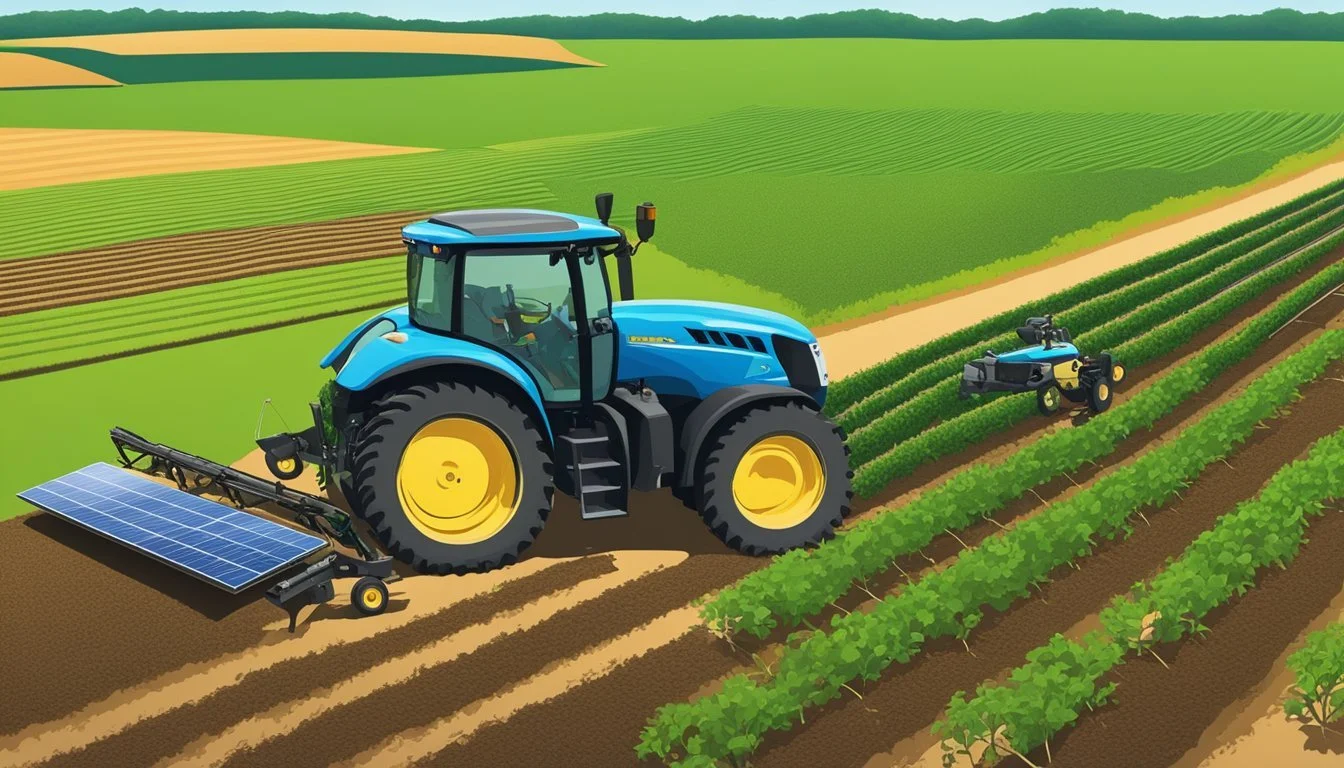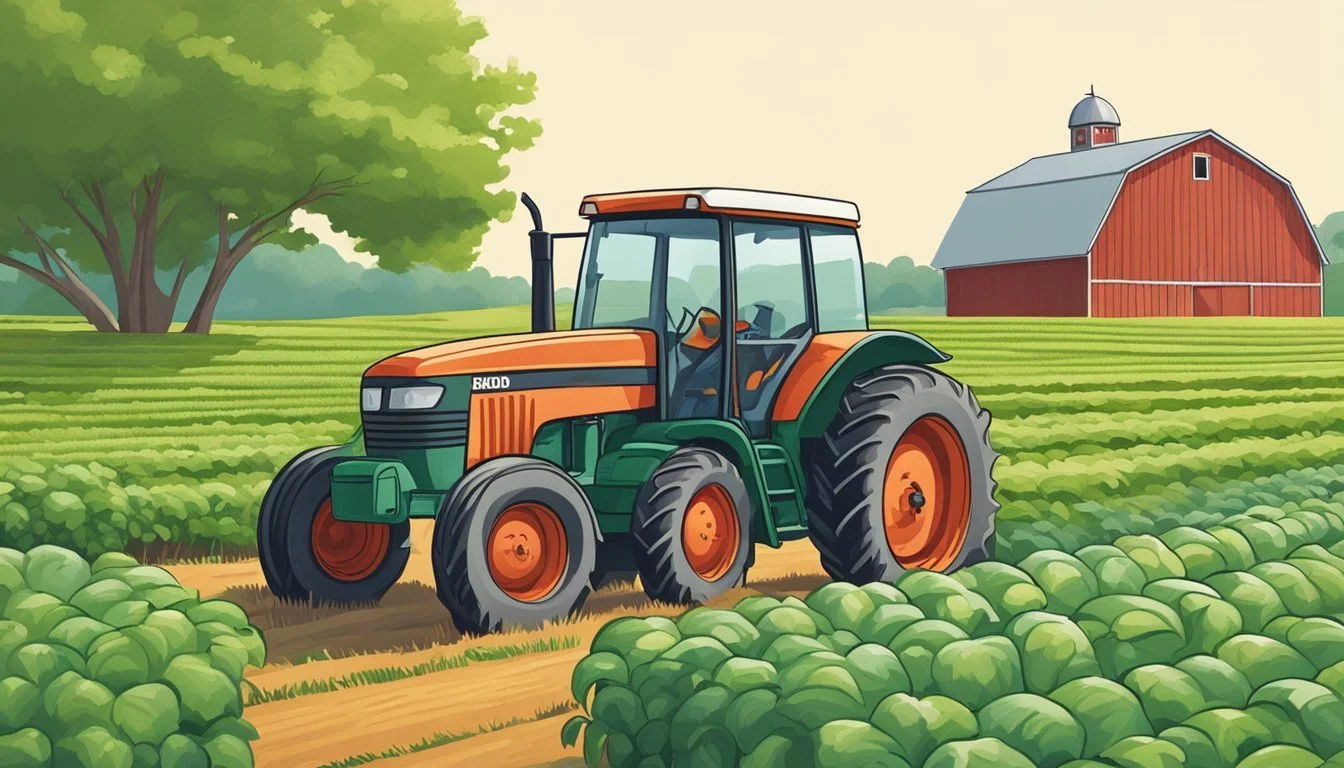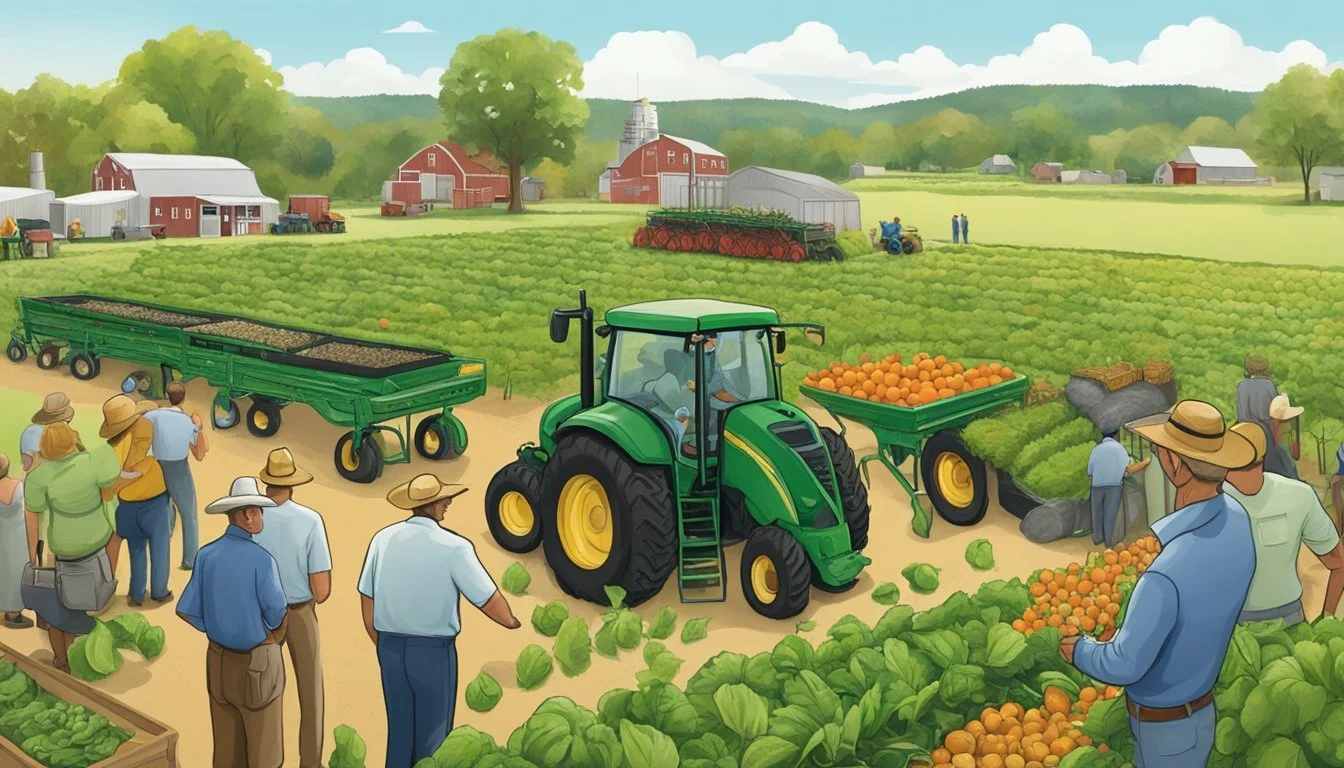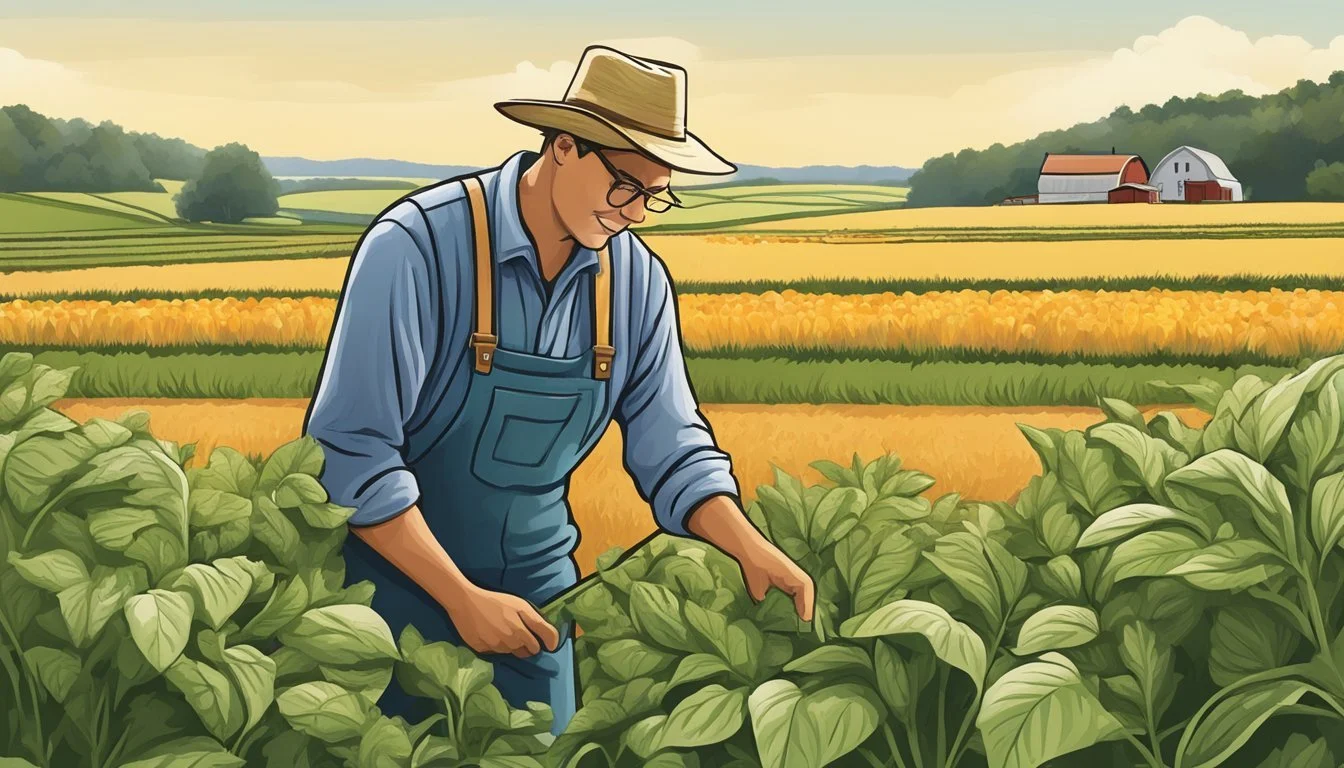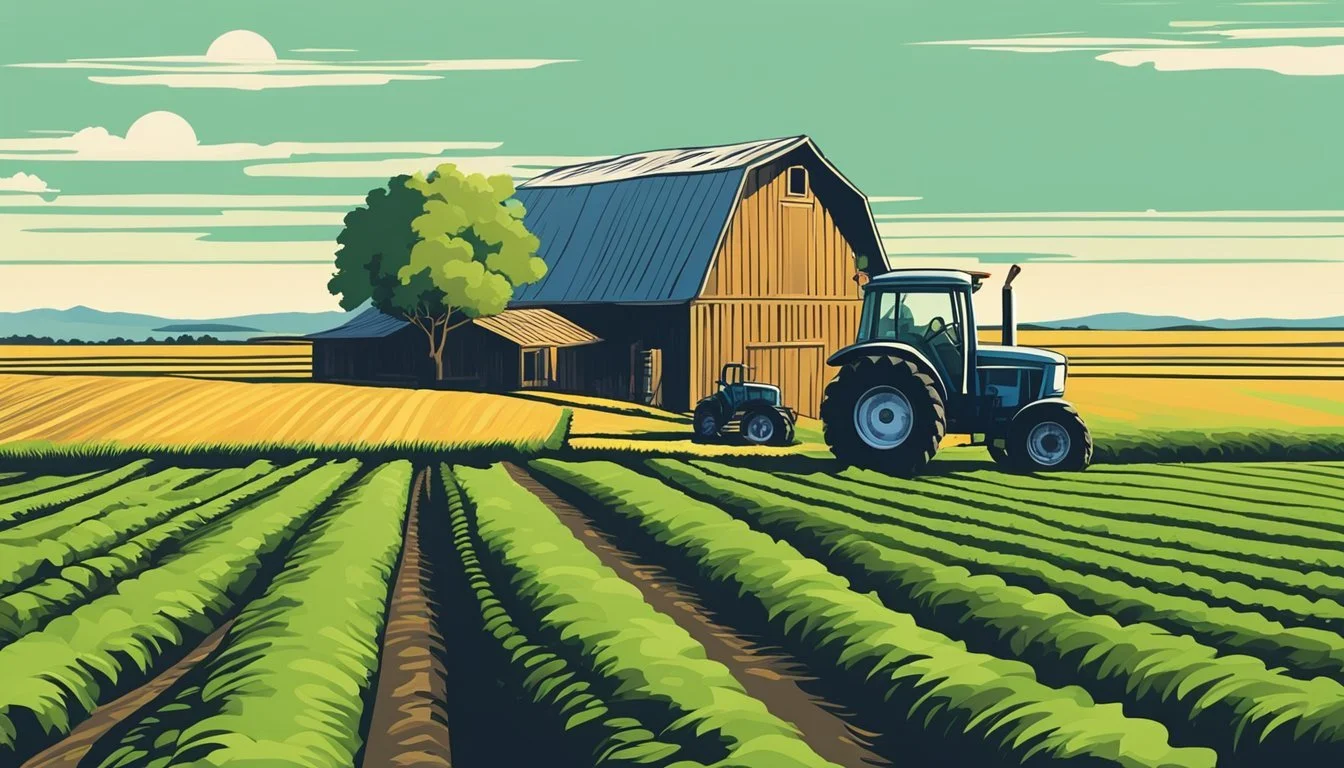Guide to Farming in Rhode Island
Essential Tips for Successful Agriculture
This Article is Part of Our State by State Farming Guide
Rhode Island, America's smallest state, is surprisingly rich in agricultural heritage, contributing a patchwork of farms and green spaces that defy its diminutive size. Farming in Rhode Island encompasses over 69,000 acres, making up about 10% of the state's land area. This commitment to agriculture ensures a diverse production of commodities including greenhouse and nursery products, dairy, sweet corn, apples, and a variety of vegetables suitable for the region's climate.
Farming in this coastal state is supported by a robust network of farmers markets and community programs that encourage direct sales to consumers. Programs like the Aquidneck Growers Market and the Providence Farmers Market are popular platforms for local farmers to sell their produce. These markets not only boost the state's economy but also strengthen the community's connection to local agriculture, ensuring that residents have access to fresh, farm-grown food.
Moreover, the state's agricultural efforts include support in the form of university-led research and community-led cooperatives. The University of Rhode Island's Vegetable Production Program creates amazing opportunities for farmers, providing them with access to the latest sustainable and profitable agricultural practices. Through on-farm workshops, newsletters, and direct consultations, growers of all sizes—from small quarter-acre vegetable plots to larger, multi-acre farms—receive personalized guidance to optimize their operations and yields.
The State of Farming in Rhode Island
Rhode Island's agriculture sector, though small in size, is a vibrant and essential part of the state's economy, covering a diverse range of farming activities from dairy to produce.
Historical Overview
Dating back to its colonial roots, agriculture has always been a staple of Rhode Island's economy. Initially, the state's farms were predominantly dairy, livestock, and produce operations. Over time, farmers in Rhode Island have adapted to changes in demand and technology, and the state has seen a shift towards diversified farming practices that include greenhouse and nursery products.
Current Landscape
Today, agriculture in Rhode Island continues to be a significant industry. With around 1,243 farms, farmland spans over more than 69,000 acres, which amounts to approximately 10 percent of the state's land area. The top commodities produced on these farms include:
Greenhouse and Nursery Products: These cover a significant portion of agricultural sales.
Dairy: Although fewer in number, dairy farms play a crucial role in the local food system.
Sweet Corn and Apples: These are key produce commodities, with sweet corn being a highly favored seasonal crop.
The state supports agriculture through various programs and grants, aimed at maintaining a robust local food system. The Rhode Island Department of Environmental Management (RIDEM) Division of Agriculture even allocates grants ranging between $550,000 and $600,000 for farming initiatives, demonstrating strong governmental support for sustaining and growing the sector. Furthermore, there's a concerted effort to monitor and manage challenges such as avian influenza, showcasing how Rhode Island strives to protect its agricultural heritage while progressing towards modern sustainable farming practices.
Fundamentals of Agriculture in Rhode Island
Agriculture in Rhode Island is characterized by its diverse soil composition and a climate that supports a variety of crops and livestock. Proper understanding and management of these elements are essential for successful farming within the state.
Soil and Climate Considerations
Rhode Island's soil is varied across the state, with a notable presence of sandy loam and rocky soil in some areas. This necessitates careful consideration when selecting crops and implementing soil conservation techniques. The climate in Rhode Island is classified as humid continental, which brings warm summers and cold winters.
Soil Types:
Sandy loam: suitable for a variety of crops due to its well-draining properties.
Rocky soil: can be challenging for cultivation but manageable with proper techniques.
Climate Factors:
Humid continental: offers a growing season suitable for traditional New England crops.
Climate Change: Rising temperatures and changing precipitation patterns demand adaptive farming practices to mitigate potential issues such as drought.
Challenges:
Drought conditions: require efficient water management and drought-resistant crops.
Soil conservation: essential to maintain soil health and prevent erosion.
Key Crops and Livestock
Rhode Island's agricultural production includes a variety of crops that are well-suited to the state's soil and climate. Potatoes and tomatoes are among the crops routinely harvested, benefiting from the state's summer growing season.
Primary Crops:
Potatoes: thrive in sandy loam with proper irrigation and are a staple crop in Rhode Island.
Tomatoes: require well-drained soil and benefit from the state's warm summers for optimal growth.
Livestock farming is another critical component of Rhode Island's agricultural landscape, with particular emphasis on dairy farming and the stabling of horses.
Livestock Farming:
Dairy cows: contribute significantly to the state's agricultural output.
Horse stabling: a notable activity, requiring adequate land and facilities.
Agricultural Business and Economics
In Rhode Island, understanding the intricacies of farm economics and navigating the agricultural tax codes and incentives are crucial for farmers to maintain profitability and sustainable development.
Understanding Farm Economics
Farm economics in Rhode Island revolves around understanding production costs and maximizing profits. Farmers must consider the price of inputs such as seeds, fertilizers, and labor and balance them against their yield outputs. The Rhode Island Farm Bureau provides guidance on economic planning, while the LASA Grant Program offers financial assistance to enhance the competitiveness of small-scale agriculture and promote innovation.
Key financial aspects include:
Cost of production
Market analysis
Profit margins
Risk management
Insurance plays a critical role in risk management, providing coverage against crop failure or livestock loss and securing the financial stability of agricultural ventures.
Agricultural Taxes and Incentives
Taxes and incentives in Rhode Island significantly impact the economics of farming. Farmers can benefit from the Farm, Forest, and Open Space Program (FFOS), which offers tax assessments based on current land use rather than potential development value, promoting agricultural preservation.
Relevant tax information includes:
Property taxes for farmlands are calculated differently to encourage preservation and farming.
Sales tax exemptions may apply to certain farming equipment and supplies.
Federal tax provisions may affect deductions for farming operations.
Agricultural incentives like the GAP Grower Certification Program support farmers by providing a framework for recognized food safety practices, which can lead to increased market access and potential premium pricing for their products.
Navigating Agricultural Policies
Navigating agricultural policies in Rhode Island involves understanding the intersecting layers of state and federal regulations, as well as opportunities provided through initiatives such as the Local Agriculture and Seafood Act (LASA). Farmers must stay informed on legislation that impacts agricultural operations, funding, and land use.
State and Federal Regulations
Rhode Island farmers operate under a complex system of state and federal regulations that influence nearly every aspect of farming practice. The state's Department of Environmental Management (DEM) plays a critical role in this, ensuring that agricultural activities meet environmental standards, benefiting both the land and the community. Moreover, at the federal level, the United States Department of Agriculture (USDA) provides guidelines and support programs which aim to promote agricultural viability and land stewardship.
DEM: Oversees environmental regulation compliance
USDA: Offers funding and guidelines for conservation and sustainability
Key legislation such as the 2023 Farm Bill demonstrates focused efforts on conservation, with recommended increases in mandatory funding for the Conservation Stewardship Program (CSP) and the Environmental Quality Incentives Program (EQIP). Rhode Island's participation in these programs ensures that farmers have access to resources and incentives to support environmentally sustainable practices.
Local Agriculture and Seafood Act (LASA)
The Local Agriculture and Seafood Act (LASA) is a foundational piece of legislation designed to bolster the state's agricultural and seafood industry. The LASA grant program represents an actionable commitment to supporting Rhode Island farmers, fishers, and food businesses through financial grants. These grants empower local producers by funding projects that enhance the sustainability, profitability, and vitality of Rhode Island's agrarian and seafood sectors.
LASA Grants: Support projects improving sustainability and profitability
Local Impact: Focuses on enhancing Rhode Island's agricultural and food community
Recipients of LASA grants range from small startups to more established operations, reflecting the state's dedication to fostering a diverse and resilient food system. The act not only preserves and protects agricultural land but also promotes opportunities for agricultural education and market growth, ensuring that farming remains a vital part of Rhode Island's heritage and economy.
Land Management and Development
In Rhode Island, effective land management and development are crucial for maintaining the state's agricultural integrity. Strategies for acquiring farmland and preserving land through conservation efforts support the vitality of Rhode Island's agricultural sector.
Acquiring Farmland
When interested in acquiring farmland in Rhode Island, potential owners must consider various options tailored to their specific needs within the fields of agriculture. The journey begins with understanding the Rhode Island Comprehensive Planning and Land Use Regulation Act, particularly the subsections relevant to agriculture. Prospective farmers should explore the resources offered by local agencies, such as the Rhode Island USDA FSA County Office, which provides comprehensive program information to guide newcomers. Financial assistance and advice on sustainable farming practices are available to ensure that farmland is both affordable and productive.
Land Preservation and Conservation
For land preservation and conservation, Rhode Island's Farmland Preservation Program plays a pivotal role in fostering an environment in which farming is a viable pursuit. Farmland classified for preservation must be devoted to sustainable agricultural or horticultural practices. The program emphasizes the importance of protecting natural resources while promoting responsible development that benefits both the environment and the agricultural community. The collaboration of multiple agencies, including the Rhode Island Department of Environmental Management and other local conservation services, ensures a concerted effort towards safeguarding valuable farmland against encroaching development.
Agricultural Risks and Challenges
Rhode Island farming is subject to a spectrum of risks and challenges, including pest infestations and complex issues around insurance and financial protection.
Dealing with Pests and Diseases
Pests: The spotted lanternfly, an invasive pest, poses a significant threat to Rhode Island's agriculture, preying on a variety of plants and agricultural crops. Farmers must remain vigilant and adopt integrated pest management strategies to mitigate this risk.
Diseases: Avian influenza, specifically highly pathogenic avian influenza, remains a concern for poultry farmers. It can devastate flocks and have far-reaching economic impacts. Proactive health management and biosecurity measures are essential to prevent outbreaks.
Insurance and Risk Management
Insurance: Access to adequate insurance is critical for farmers to protect against unforeseen losses due to pests, diseases, or other natural calamities. It is a crucial component of comprehensive risk management for Rhode Island farms.
Risk Management: Effective risk management involves a detailed understanding of potential threats to crop and livestock production and implementing strategies to mitigate those risks. This includes both financial tools, such as insurance, and agricultural practices designed to reduce vulnerability to pests and diseases.
Technology and Innovation in Farming
Rhode Island’s agricultural sector is swiftly embracing new technologies and innovations to enhance production and sustainability. These advancements are evident in the modernization of farming techniques and the development of greenhouses and aquaculture facilities.
Modern Farming Techniques
Farmers in Rhode Island are increasingly incorporating advanced technologies such as precision agriculture to optimize their farming practices. Precision agriculture involves the use of GPS-guided tractors and drones, which allow for precise planting, watering, and application of fertilizers and pesticides. This method not only increases crop yields but also reduces waste and environmental impact.
Tractors: Equipped with GPS technology for precise field navigation.
Drones: Used for crop monitoring and to assess field conditions.
These tools create a more resource-efficient farming environment and contribute to a sustainable future for agriculture in the state.
Greenhouse and Aquaculture Advances
Rhode Island is experiencing significant growth in controlled environment agriculture, particularly greenhouses. These structures are key for year-round crop production, independent of the external climatic conditions.
Greenhouse technology advancements include:
Automated temperature control systems
Energy-efficient lighting
High-efficiency irrigation systems
Aquaculture in Rhode Island is also flourishing, with oysters being one of the prominent sectors. The state supports innovative approaches to aquaculture that enhance production while maintaining environmental health.
Oysters: Farmed using methods that support water quality and ecosystem health.
Aquaculture technologies: Include modern feeding and monitoring systems that ensure optimal growth conditions and disease prevention.
These developments reflect a commitment to sustainability while bolstering the local economy through the food sector.
Marketing and Distribution
The marketing and distribution strategies within Rhode Island's agricultural sector are pivotal for bridging the gap between farmers and consumers. They define the journey of local produce from the farm to the marketplace, fostering a robust local food system.
From Farm to Market
Farmers in Rhode Island utilize an array of channels to move products from fields to consumers. Distribution plays a critical role—whether it's through home delivery systems or supplying to local retail sales outlets. The Rhode Island Department of Environmental Management (DEM) supports the use of agricultural land for such purposes, enhancing the local food system by ensuring that high-quality produce reaches markets effectively.
Local farmers are encouraged to engage with marketing initiatives to maximize visibility and sales. The Rhode Island Farm Bureau, for instance, offers resources to help farmers understand how best to promote their goods. Marketing includes branding efforts and educational drives, like the Harvesting Rhode Island television series, which elevates public awareness about the benefits of purchasing locally-sourced products.
Advancing Direct-to-Consumer Sales
Direct-to-consumer sales have become a cornerstone of Rhode Island agriculture, with programs like the Senior Farmers Market Nutrition Program augmenting the reach of farmers directly to consumers. It gives consumers access to fresh produce through home delivery or pickup, fostering a personal connection with their local farmers.
This direct engagement strategy not only improves retail sales, but also supports the richness and sustainability of the local food ecosystem. Farmers find more stable revenue streams by tapping into community-supported agriculture programs (CSAs) and farmers markets, with the added benefit of receiving immediate feedback from their customer base.
Community and Partnerships
In Rhode Island, the farming community thrives on collaboration and mutual support. Partnerships among local businesses and farmer organizations are vital to the success and growth of the agricultural industry within the state.
Farmer Organizations and Cooperatives
Rhode Island farmers benefit greatly from a variety of organizations and cooperatives that provide support, resources, and advocacy. These entities play a crucial role in helping new and established farmers navigate the complexities of farm management, financing, and conservation. Cooperative Agricultural Pest Survey (CAPS) programs, for instance, are a significant aspect of cooperative efforts, assisting in the detection and management of agricultural pests that can impact farm productivity and ecosystem health.
Partnerships with Local Businesses
Local businesses and farms often enter into partnerships that are mutually beneficial. For example, a community-supported agriculture program might partner with a nearby farm to provide fresh produce for its members, ensuring a consistent market for farmers and fresh, local options for consumers. These partnerships can help increase farm revenues and stabilize local food systems. In turn, they can bolster the community's economy and reinforce the importance of agriculture in Rhode Island's cultural and economic landscape.
Organizations like the Rhode Island Farm Bureau and cooperative efforts such as Produce Aggregation Programs have shown that supporting local agriculture through business partnerships leads to tangible benefits, such as revenue growth for local farmers, as exemplified by the 37% revenue increase for farmers who participated in 2020.
Support and Resources for Farmers
Rhode Island provides a wealth of resources aimed at fostering the success and growth of its farming community. By leveraging these resources, farmers can gain valuable education, training, and funding assistance for their agricultural endeavors.
Education and Training
Farmers in Rhode Island have access to various educational and training programs. For young farmers and veterans new to agriculture, these programs offer crucial information and skills development. The training covers a range of topics, from sustainable farming practices to business management. Resources and training opportunities can be found through local organizations and on relevant websites with a focus on agricultural education.
Training Topics Include:
Sustainable Agriculture Methods
Business Management and Planning
Conservation Strategies
Resources for Education and Training:
Workshops and seminars
Online courses and webinars
Hands-on apprenticeships
Grants and Funding
Securing financial support is paramount for the growth and viability of farms. Rhode Island's farmers can take advantage of grant programs such as the Local Agriculture and Seafood Act (LASA Grant Program). These grants support local food and seafood initiatives, assisting with diverse activities from marketing to development. The program encourages applications from farmers at varying levels of experience and operation.
Grant Opportunities:
LASA Grant Program: Focused on the advancement and marketing of local produce and seafood in Rhode Island.
How to Search and Apply for Grants:
Visit Rhode Island's Department of Environmental Management website.
Explore active grant listings and eligibility criteria.
Follow application guidelines carefully to optimize the chance of receiving funding.
Environmental Impact and Sustainability
Rhode Island's commitment to sustainability shapes its agricultural practices, ensuring a reduced environmental impact and promoting an eco-friendly approach to tourism.
Sustainable Practices
Rhode Island farmers are adopting sustainable agricultural practices to mitigate environmental impact and enhance food security. Sustainable practices include:
Crop Rotation: This helps in maintaining soil health and reducing pest outbreaks.
Integrated Pest Management (IPM): IPM reduces the reliance on chemicals, opting for natural pest control.
Organic Farming: Encouraged by state initiatives, it preserves local ecosystems.
Agriculture and Tourism
Agriculture influences tourism in Rhode Island by offering agritourism experiences that are both educational and recreational. Key aspects include:
Farmers' Markets: They serve as spaces for visitors to engage with local farmers, fostering a deeper understanding of sustainable agriculture.
Agritourism Activities: These include farm tours and pick-your-own experiences, which highlight the state's commitment to environmental stewardship.
Emerging Trends in Rhode Island Farming
Rhode Island is experiencing a shift in agricultural methods, emphasizing sustainable and high-yield production within urban settings and the adoption of organic and artisanal practices.
Urban Farming
Urban farming initiatives are transforming pockets of Providence and Warwick into productive agricultural spaces. By leveraging innovative growing methods like hydroponics and vertical farming, these urban farms can produce considerable yields in confined areas. In Providence, community gardens and rooftop farms illustrate a growing trend where city residents actively participate in food production, often with objectives that extend beyond simple hobby gardening.
Providence: Community-based urban agriculture projects.
Warwick: Adoption of hydroponics and other space-efficient technologies.
Organic and Artisanal Farming
Organic farming is garnering increased interest as Rhode Island farmers focus on sustainability and meet consumer demand for wholesome, chemical-free produce. Newport County's fertile lands are now host to a range of farms that forgo conventional farming methods in favor of organic practices. Meanwhile, artisanal farming — producing high-quality, uniquely crafted food products — is becoming a staple in Rhode Island's agricultural narrative, reflecting a broader trend of valuing quality and locality.
Newport County: Expansion of farms using organic methods.
Statewide Impact: Growth in the production of specialty artisanal goods, reflecting a blend of tradition and innovation.
Conclusion
Agriculture in Rhode Island presents a diverse and dynamic sector essential to the state's economy. Integrating traditional practices with modern conservation techniques, farmers contribute significantly to both local food supply and conservation efforts. Resources for farmers, including financial aid, grant programs, and guides to zoning ordinances, are integral to sustaining and developing the industry.
Future Perspectives
With a focus on sustainability, Rhode Island's agricultural sector appears poised for continued growth. Investments in technology and adherence to conservation plans suggest a resilient industry adaptable to change and adept at meeting evolving consumer demands.
Farming Resources
Farmers in Rhode Island have access to a variety of resources to aid in land acquisition, farm planning, and navigating zoning laws. Support networks and state-sponsored guides provide a solid foundation for both existing and prospective farmers.
In summary, the farming community in Rhode Island enjoys a supportive environment that enables a diverse range of agricultural activities. It is in a strategic position to maintain and enhance its contributions to the state's culture, economy, and landscape.






